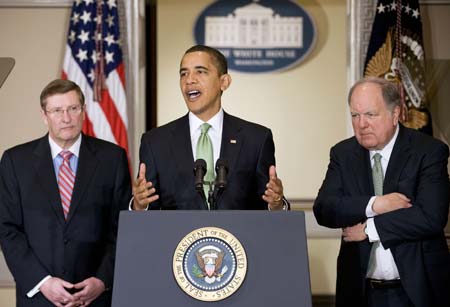| U.S. President Barack Obama on Tuesday defended his 3.6-trillion-dollar budget, describing it as "an economic blueprint for our future -- a foundation on which to build a recovery that lasts."
The budget for the 2010 fiscal year, Obama's first budget submitted to Congress last month, seeks to shore up the nation's economy that has been in a recession since December 2007 while also overhauling health care, energy and education.
 |
|
U.S. President Barack Obama (C) speaks about the budget after meeting with congressional leaders at the White House in Washington, March 17, 2009. (Xinhua/Reuters Photo) |
"To kick these problems down the road for another four years or another eight years would be to continue the same irresponsibility that led us to this point," Obama said in an appearance with the heads of the congressional budget committees.
"That's not why I ran for this office. I didn't come here to pass on our problems to the next president or the next generation," he added.
This budget does not attempt to solve every problem or address every issue, Obama said, pushing back against criticism that he is trying to take on too many issues at once.
"Because of the massive deficit we inherited and the enormous costs of this financial crisis, we have made some tough choices that will cut our deficit in half by the end of my first term and reduce it by 2 trillion dollars over the next decade," he said.
"What we will not cut back, however, are those investments that are directly linked to our long-term prosperity," said the president.
He urged Congress to pass the budget, which assumes a deficit of 1.75 trillion dollars for the 2010 fiscal year, which begins on Oct. 1, 2009.
In this moment of enormous challenges, the American people "are watching and waiting for us to lead," he said.
"Let's show them that we're equal to this task before us. Let's pass a budget that puts this nation on the road to lasting prosperity," he urged.
U.S. federal budget deficit soared to 569 billion dollars in the first four months of the current fiscal year, which ends on Sept. 30 this year, marking the highest on record for this period.
The deficit for October 2008 through January 2009 was six times more than the red ink during the year-ago period and has already surpassed the imbalance for all of last year, which was 454.8 billion dollars, a full-year record.
The bipartisan Congressional Budget Office has projected that the budget deficit will hit an all-time high of 1.2 trillion dollars in the current fiscal year. The estimate doesn't include the cost of Obama's 787-billion-dollar economic stimulus bill.
(Xinhua News Agency March 18, 2009) | 